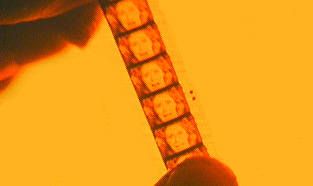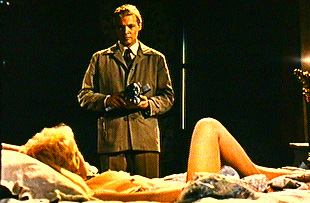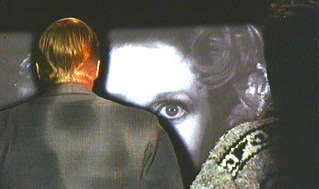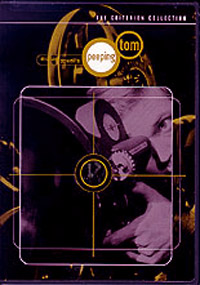| Release List | Reviews | Price Search | Shop | Newsletter | Forum | DVD Giveaways | Blu-Ray/ HD DVD | Advertise |
| Reviews & Columns |
|
Reviews DVD TV on DVD Blu-ray International DVDs Theatrical Reviews by Studio Video Games Features Collector Series DVDs Easter Egg Database Interviews DVD Talk TV DVD Talk Radio Feature Articles Columns Anime Talk DVD Savant HD Talk Horror DVDs Silent DVD
|
DVD Talk Forum |
|
|
| Resources |
|
DVD Price Search Customer Service #'s RCE Info Links |
|
Columns
|
 |
PEEPING TOM
|
||||
Forty years ago Peeping Tom premiered and disappeared within a week, becoming one of the most critically despised English film ever made. It effectively ended the film career of one of Britain's most creative and intelligent filmmakers. In 1980 Martin Scorsese rescued the film from oblivion, sparking a reevaluation that has redeemed its critical reputation. Criterion's DVD goes several steps further. In addition to a stunningly perfect presentation of this disturbing and fascinating movie, the new release features a documentary that vividly captures the amazingly complex historical and intellectual puzzle that is Peeping Tom.
Mark Lewis (Karl Boehm) is an introverted feature camera assistant. His off hours are consumed with a secret obsession -- filming the "un-filmable" Face of Death on women being murdered ... while he is murdering them. Mark allows himself to be drawn into a relationship with Helen, the girl downstairs (Anna Massey, the hapless potato victim in Alfred Hitchcock's Frenzy), and struggles to understand his sickness and perhaps work his way to a cure. It seems Mark was the childhood guinea pig of a scientist father who used him in cruel, mind-warping experiments, "research" that the adult Mark is himself perversely continuing. This synopsis reads like a modern slasher film, which Peeping Tom never even begins to resemble. There is almost no blood and none of the explicit violence of the same year's smash success Psycho. The film plays like a clever puzzle filled with clues: allusions, jokes, visual references. All center around the proposition that, by their vicarious involvement in the stories they watch, film viewers become complicit in the fantasies they experience. 
This most intelligent film about cinema is a horror film told with the inspired simplicity that director Michael Powell brought to an armload of classics. The Thief of Bagdad, I Know Where I'm Going! and The Red Shoes defy the rules of both their genres and the times in which they were made. Powell specialized in stories that challenged English attitudes and assumptions. In Peeping Tom he took on the dangerous task of portraying the truth about the relationship between cinema and voyeurism, between the fantasies we seek on the screen and the fantasies we hide in our personalities. Although it is not an art film, Peeping Tom is difficult to discuss without debating the appeal of movies as a link to forbidden desires, or contemplating the passive/active component of Film as Fantasy. Michael Powell was crucified for making a "perverse" movie, when what he and writer Leo Marks actually did was deliver the unwelcome truth that the fundamental perversity of filmmaking and movie watching makes us all Peeping Toms. The excellent, excellent Channel 4 U.K. documentary that accompanies the feature, A Very British Psycho is without a doubt the most rewarding DVD supplement Savant has ever seen. I've read a lot on Peeping Tom but the docu was like a bullet to the brain, full of insights and inspirations. To begin with, half the show is about Tom writer Leo Marks, who was a top code master during WWII. How that story relates to Peeping Tom (and some wonderful poetry) makes for a very unusual structure. Marks' wartime job involved inventing "unbreakable" codes (an impossibility) and sending people off to live or die on the quality of his intellectual work. Peeping Tom came about from the compassionate / cold blooded relationship Marks had to maintain with his spy operatives, and the macabre intimacy he had with some of their horrible fates. In Marks' unenviable position, a callous disregard for the lives of his agents was often in the best interest of the War Effort. For Peeping Tom's Mark Lewis (the author's name in code?) the inhuman half of the equation has taken over. In his quest for the un-filmable image Lewis has alienated himself from the human race, and become a serial killer. Through beautiful on-camera interviews with many of the principals involved, the docu also shows how the film was destroyed by the critics, its relationship to Psycho and how Hitchcock avoided repeating Powell's commercial fate. The docu is also one of the few to intelligently utilize clips from the film it is studying. Bits of scenes are even successfully reenacted: "What paper am I from? Oh. The Observer." Peeping Tom effectively uses color schemes and lighting to create specific psychological reactions; one can feel the atmosphere at times. Vittorio Storaro once wrote an essay in American Cinematographer about the psychological effects of color in One From the Heart. The editors of that magazine felt it necessary to print an insulting disclaimer stating that it didn't endorse Storaro's theories! Peeping Tom was the movie that made me feel Storaro was right after all. Helen rises into a shadowy close-up as she watches some unspeakable projected image, with watery highlights in her eyes showing her terror. The fleeting glimpse of nudie model Milly (Pamela Green) lying across the bottom of the frame, a glowing, slightly overexposed altar of red flesh, has the effect of an erotic hallucination. 
Peeping Tom and Psycho are opposite sides of the same Horror coin, movies with different approaches to similar material. Each is complex and illuminating in a different way. Psycho is rooted in clinical truth about serial killers whereas Tom is a less organic (but more enlightening) intellectual puzzle based on the nature of cinema itself. Both offer visual revelations at a staggering pace: Psycho's mirror-doppelgangers, Peeping Tom's strange Hopper-like shot of Mark Lewis waiting at the base of a concrete housing structure, an uncannily sinister composition. Every aspect of the film has its own fantastic dimension. The rooms of Mark Lewis' house, for example, would seem to represent psychological domains, with his curtained, film-filled lab the secret repository of taboo memories. A surprise after all these years is to see a precursor of Hitchcock's superimposed Psycho skull-face in one very complex shot (see below). Note that only the part of the image of Moira Shearer projected onto the screen has eyes in its eye sockets! Criterion's DVD of Peeping Tom is stunning to behold. Here for once is a fairly obscure horror film whose critical visual dimension is well served. Colors and textures leap off the screen; the opening Soho street scene is so garish it jumps out at you. Both the feature and the documentary are mastered in 16:9. The shelves of the magazine shop are lined with dozens of girlie postcards whose contents were a blur on the laser disc but now are crystal clear. The 1:66 aspect ratio is achieved in 16:9 by placing narrow black 'bookends' onto the sides of the image. Flat-widescreen films were intended to be cropped off to varying degrees and Criterion has used excellent judgment in this case. 
The sharp and clear mono sound is full of effective surprises, such as the heartbeat that pounds through the scene where Helen's blind mother meets Mark, and unnerves him with her apparent ability to "see" his sickness. Laura Mulvey's commentary track, analyzing the film in shot by shot Cinema 101 detail, is best sampled after seeing the documentary. Although good, it is definitely deep-dish art-speak. Then again, seeing the docu will convert many viewers into wanting to hear as much analysis of Peeping Tom as possible! A simple paper insert reprints Ms. Mulvey's liner notes from the previous laser disc. The only weakness is the box art, which is not only unattractive, but manages to obscure the film's title. Nobody is going to find this one on a store shelf. Criterion's Peeping Tom DVD restores one's faith in horror films, movie documentaries and general intelligence in the cinema universe. Criterion is to be applauded for transferring this superior film in such stunning fashion. If you aren't inclined to buy Peeping Tom, for heaven's sake find a way to rent it ... it can alter one's perception of what movies are.
On a scale of Excellent, Good, Fair, and Poor, Peeping Tom rates:
Other Michael Powell - Emeric Pressburger reviews:
Black Narcissus
Review Staff | About DVD Talk | Newsletter Subscribe | Join DVD Talk Forum |
|
| Release List | Reviews | Price Search | Shop | SUBSCRIBE | Forum | DVD Giveaways | Blu-Ray/ HD DVD | Advertise |






